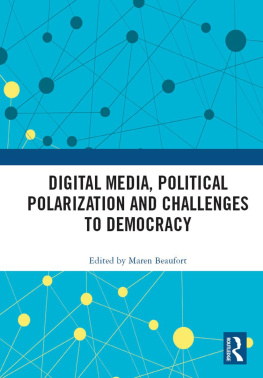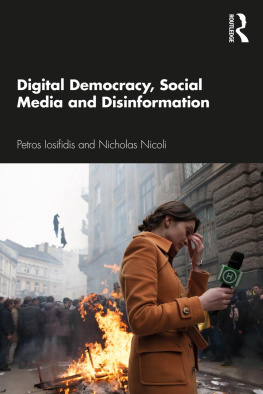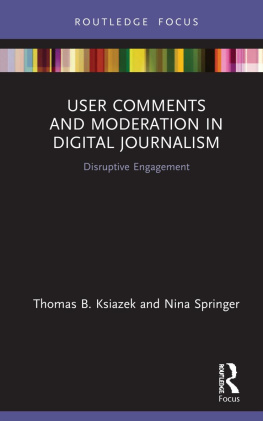
Digitizing Democracy
What are the key challenges facing our increasingly digitized democracy, and how might we as citizens contribute to resolving them? This book explores these questions, adopting a multi-disciplinary approach that combines work from media studies, journalism studies, and political science scholars, and draws on trends in countries including Australia, the United States, the United Kingdom, Egypt, and Indonesia. The book is divided into four main themes: (1) the impact of digital communication on politics and government; (2) the future of news and journalism in the network society; (3) the potential of digital media to enhance civic engagement and social inclusion; and (4) visions for the future of digital democracy.
Aljosha Karim Schapals is a Lecturer in Journalism and Political Communication at the Queensland University of Technology in Brisbane, Australia, and a Research Associate in the Journalism beyond the Crisis project funded by the Australian Research Council.
Axel Bruns is a Professor in the Digital Media Research Centre at Queensland University of Technology, Australia. His latest book is Gatewatching and News Curation: Journalism, Social Media, and the Public Sphere.
Brian McNair is the author of many books and essays on journalism, including Fake News (Routledge, 2018), Introduction to Political Communication (6th edition, Routledge, 2017), and Communication and Political Crisis (Peter Lang, 2016).
Routledge Studies in Media, Communication, and Politics
Digitizing Democracy
Edited by Aljosha Karim Schapals, Axel Bruns, and Brian McNair
Digitizing Democracy
Edited by Aljosha Karim Schapals, Axel Bruns, and Brian McNair
First published 2019
by Routledge
711 Third Avenue, New York, NY 10017
and by Routledge
2 Park Square, Milton Park, Abingdon, Oxon OX14 4RN
Routledge is an imprint of the Taylor & Francis Group, an informa business
2019 Taylor & Francis
The right of the editors to be identified as the authors of the editorial material, and of the authors for their individual chapters, has been asserted in accordance with sections 77 and 78 of the Copyright, Designs and Patents Act 1988.
All rights reserved. No part of this book may be reprinted or reproduced or utilised in any form or by any electronic, mechanical, or other means, now known or hereafter invented, including photocopying and recording, or in any information storage or retrieval system, without permission in writing from the publishers.
Trademark notice: Product or corporate names may be trademarks or registered trademarks, and are used only for identification and explanation without intent to infringe.
Library of Congress Cataloging-in-Publication Data
CIP data has been applied for.
ISBN: 978-1-138-48344-6 (hbk)
ISBN: 978-1-351-05486-7 (ebk)
Typeset in Sabon
by codeMantra
Every Thursday night in the United Kingdom, millions of viewers tune in to one of the BBCs flagship programmes, Question Time. Hosted by veteran TV presenter David Dimbleby, the format gives audience members the rare opportunity to directly engage with politicians across all sides of the political spectrum. Uniquely, the panel programme allows the electorate to hold their governing politicians accountable in a live and unedited setting a privilege usually reserved for the political opposition in the weekly, fiery exchanges at the dispatch box during Prime Ministers Questions in the House of Commons. Last year, the show was the second most tweeted-about TV programme in the United Kingdom, preceded only by the somewhat controversial dating reality show Love Island. Elsewhere, Question Time-style programming has attracted equally impressive followings: here in Australia, for example, the ABCs Q&A draws around half a million viewers to their television screens every Monday night. Clearly, there seems to be an appetite for what its producers label democracy in action: audience members can actively participate in political debates and hold their politicians accountable. Power is held up to scrutiny, and politicians are pressed by the shows host when they as so often in the past fail to give a straight answer.
Similar powers have been ascribed to the Internet, and to social media in particular: even to this date, the 2011 Egyptian revolution serves as a powerful reminder of the facilitating role social media have played in coordinating and organising the political movement that so impressively helped challenge the political status quo. Effectively, these platforms had transformed from being merely social in their nature to becoming rapidly and primarily political. It is somewhat sobering to remember, however, that authoritarian governments can also exploit social media for their own purposes to monitor and crack down on citizens, and that the popular enthusiasm of the Egyptian revolution (and of similar uprisings during the Arab Spring) were eventually neutralised by the new authoritarian regimes that emerged to fill the power vacuum. Of all the Arab Spring countries, only Tunisia retains even a semblance of that democratic promise.
But just how can this be squared with the popular belief that social media facilitate greater expression, amplifying previously unheard voices by average citizens? From Britains decisive vote in June 2016 to leave the European Union to Donald Trumps election as US President later in the same year, the tectonic plates of international politics are shifting in perhaps unprecedented ways. And in both cases, social media amplified emotionally charged and frequently populist views that helped shape campaigns playing on irrational fears over immigration more so than reasoned and sober political debate. In this day and age, are we, perhaps, witnessing some of the unintended consequences of an increasingly digitised democracy? Have the populist enemies of democracy become better at using digital and social media to bend public opinion to their will than the traditional defenders of the democratic process?
Recent political developments give credence to that view, and do suggest that there are, indeed, troubling times ahead: at the time of writing, only a few days have passed since Channel 4 News published its explosive account of London-based data mining company Cambridge Analytica. The company has long boasted that its highly complex algorithms developed have enabled it to strategically target undecided voters with content tailored to what their Facebook profiles reveal about them and their innermost thoughts but crucially, without their knowledge or informed consent. Yet Channel 4s four-month undercover investigation revealed that Cambridge Analytica frequently made use of honey traps, bribery stings, and prostitutes to discredit oppositional figures in key elections around the world. Cutting-edge mis- and disinformation campaigns, via digital and social media, and the conventional tools for entrapping and influencing key actors, are now joined in powerful combination in the toolkits of state and commercial intelligence services.






